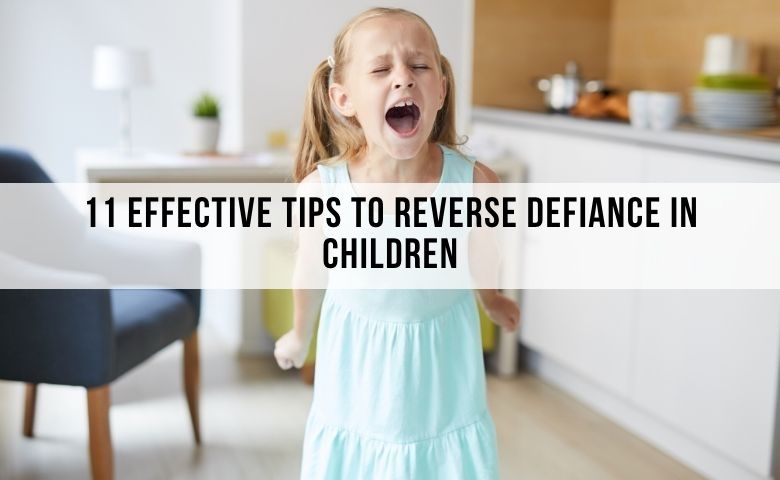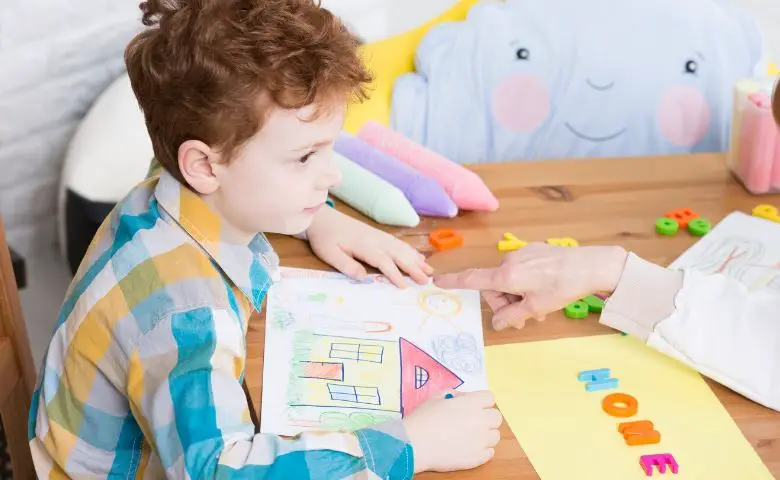11 Effective Tips To Reverse Defiance in Kids
Is your kid being defiant and throwing those temper tantrums? There are some things you can do to reverse this kind of defiance in kids.
There is something about your child looking straight into your eyes and saying, “No, I will not do this,” “I hate you” or maybe “you can’t make me do this,” which challenges to your core.

Do you find it consistently difficult to make your toddler listen to you? Are you on the verge of losing your cool?
Then you are not alone!
If you really are nodding yes to all the questions above, then this post is for you.
As a mom, you have a lot on your plate on a daily basis and this behavior of a child can seriously blow you up. But I assure you, you can handle this annoying behavior better when your goal is to utilize your relationship with a child as motivation rather than ineffective results and punishment.
Defiance in kids affects anywhere from 6 to 10 percent of children. It is basically a set of negative behaviors towards adults often mistaken for disorders like ODD (Oppositional Defiant Disorder) that share some characteristics. But it is not always the case.
Some of the set of behaviors exhibited by kids showing defiance include:
- Loses temper very often
- Argues with adults
- Refuses to comply with adult requests
- Blames others for his mistakes
- Deliberately annoys people
- Is easily annoyed by others
- Is angry and spiteful
Does It Mean A Child Has ODD?

If a child exhibits four or more of these behaviors it is ok but if it is for six months or longer, he would likely be diagnosed with ODD, unless there was an alternative explanation. An alternative explanation can be some sort of trauma or a stressful situation. But overall the most important is to consider the frequency and intensity.
All kids exhibit some of these behaviors, but if its extents it relates to an ODD child. ODD may develop at any time, over time, and maybe secondary to another diagnosis.
A common trait of kids with ODD is that they often see themselves as victims and feel justified in acting out and that they feel even more justified in what they’re doing. This often leads to defiance in kids!
Parents are often intimidated by this behavior because it is difficult to deal with it and sometimes, they simply give up. Again, you need to learn to respond to them
The demands of parenthood let alone motherhood can be tough, but when kids become defiant those demands become overwhelming. It is always better to take early steps and keep things under consideration.
So, If It’s Not ODD Then Is It A Phase?
It is absolutely normal for children to become oppositional at certain ages like around age 2, and then again in early adolescence. Different events can be responsible for such behavior such as divorce or other issues in a family. This defiant behavior can be difficult for parents to cope with, but most of the time it necessarily doesn’t mean a signal to an underlying condition.
P.S. Still if your child’s behavior is severe, seek advice from your pediatrician or a mental health professional and share everything with them.
What I mean to say is this is not the dead end. If you are struggling with a child who is aggressive, argumentative, or defiant, there are things you can do to improve this situation.
11 Effective Tips To Reverse Defiance in Kids
Consider incorporating the following tactics into your overall parenting strategy.
Battle With Your Own Stress First

Parenting is an often-stressful job, but then if you add stressors of the job, relationships, money, and others the pressure can be overwhelming. Children can sense and pick the change in your voice or behavior and it causes them anxiety, fear, and stress of their own.
When the stress is from outside, it leads to hectic parenting which further leads to defiance in kids. There is no better way than to calm yourself and incorporate some good stress management strategies.
I know as a mom there are so many things going on in our minds at once, it gets so hard to contemplate on one at a time. Try to relax and give yourself time. There are many ways for that, like exercising (if too hard for you as a mom follow these steps to start working out as a busy mom, taking some time off from the chores, and giving yourself me-time and having a good diet.
There is no better tool for staying calm than the use of positive self-talk. For instance, your child doesn’t want to get dressed like you want him. You can simply speak to yourself that you don’t care and he has to dress himself up like you want him to, but don’t say it aloud. You can talk use some helpful self-talk like, “Deep breath. He doesn’t want to get dressed and I want to yell, but I can stay calm.”
If your kids are small enough to talk to, then talk to someone else and seek guidance and counseling. This will help you get over your worries and fears if not your problems. Surround yourself with positive people who can change the perspective of how you see and do things and will help yourself raise a better family.
Download my Free E-book: How To Become A Calm And Happy Mom
Provide A Safe Home Atmosphere

Defiance in children often follows on situations at home which a child doesn’t consider normal. Give them a normal and welcoming environment. Often events like divorce, remarriage, moving or having a new baby can bring disconcert to children and end up with them acting defiant.
These life events can wreak havoc on a child’s physical and mental well-being. This severely affects their sleep patterns, their behavior and so on. When they aren’t getting enough rest, small problems are amplified and end up in larger issues.
Try to keep an open dialogue with your child before, during and after certain life-changing events. This will help foster a sense of a safe and secure home environment.
Have A Healthy Lifestyle

There is a number of studies show links between diets that are high in processed ingredients, refined sugar, and grains, etc. with an increase in the occurrence of ODD or defiance in kids. A lack of a proper diet can also result in mental health problems. It is time to start making some healthy life choices.
Model having a well-balanced diet for yourself and your family. Encourage children to eat a healthy diet that’s good for their health and brain. Also, it is better to get your children 60 minutes of active play that incorporates rigorous activity.
Show Good Behavior To Them

Honestly, think about times when you showed or modeled maladaptive behavior. How do react in front of the kids when you see a bus driver cuts you off in traffic? How about when someone is rude to you or isn’t listening? And above all, how are you treating or having a connection with your parents? Is it something you are proud of to teach your kids?
These are a few questions we should keep asking ourselves. Children learn what they see not what we tell them to do. They have tiny brains that adapt to what it senses around it. They will do exactly what they see and this imitation is pretty much natural.
Try to reinforce a positive attitude by getting close to them. If your child struggles with anything, for instance, a game which leads him to get frustrated when he loses. Join them and play with them to model good parenting style.
Give them hope and help them when they need it. Praise the desirable behavior but refuse to engage emotionally with their frustration. Try to fix this gap that is between you and a child. Often kids are more comfortable with their own age groups, but there are times when they need their parents to be all eyes and ears. So be one and fill in this gap between you and your child.
Show Them Understanding

Family and relationships are fairly not just delivering your point of view and showing your perspective of how things should go. It is about listening to what others have to say. One of the worst mistakes we as a parent make is to go against our children’s wishes which ultimately makes the situation worse.
Instead of going against their wishes, try to show them that you understand them. This will help you have closure with them and to bridge any generation gap that is making its way between you and your child.
When we learn to listen, we will learn to understand. Giving lectures all the time is never a good idea. This is very important if we want to understand our children’s priorities. This type of attitude provides solutions to problems arising within families. It is important to understand that even if your child is young and small, it doesn’t mean he cannot have preferences and interests independent of yours.
Praise The Right Behavior

Even the best and well-meaning parents often skip the praising good behaviors part and start focusing on behaviors they find problematic. This is natural but as parents, we shouldn’t always expect them to listen to what we say and understand it.
Humans are wired to notice when something is wrong but constantly correcting a bad behavior will only call attention to it. The good rule is to praise twice as much as you correct. To be reinforced, good behavior should be praised immediately. Include physical rewards such as a high five, a pat on the back, or a hug, and so on. This way we teach them which behavior results in a good outcome.
Your toddler has to be told over and over again about his unacceptable behavior. Instead of nagging about it affirm the right way to behave well without losing your cool.
If your child is throwing toys, instead of asking him to pick it up to tell them that these toys are for playing and not to throw like that. Or if he goes extreme to scream or lying on the floor, tell him this behavior is not acceptable.
Always guide your child to behave the way you want him to behave instead of just telling him not to behave in a certain way.
This is how you can handle the defiant behavior of a child. This is not easy and it will take time but it’s worth trying.
Think Of Your Child Positively

Just try to think about why they refuse to obey you? Imagine getting up early in the morning and before you even took a breath you are told what to do and what not.
Your whole day is planned even before brushing your teeth. You’re told what to wear, what to eat and so on. I am not saying to give your children hold on every single thing they do in a day but try on their perspective where they are given close to zero autonomy.
Don’t you think they will desire for power too, if not anything then the power to defy?
For raising kind, respectful and smart kids we must first learn their level of understanding and obedience. Their tiny brains are just under development and they need gentle guidance. Trust them to turn things around. Just because your child is refusing to eat now doesn’t mean he will not eat another 15 minutes. Hold on the vision that he will eventually comply with your request.
Guide Them Through Humor And Play

Humor doesn’t mean sarcasm and teasing your child. What it means is you can crack jokes now and then and keep them entertained. It’s just simple steps to getting closure with them.
Watch them laugh and after some silly laughs and giggles, they will likely comply. On the other hand, playing helps you spend time with them which they will love the most. Encourage power play where you give your kids a powerful role.
I know it’s hard, very hard to keep yourself calm and not getting your nerve to get busted. But, remember your children are in a state where they are learning to handle things themselves by watching you. Be a role model for them if you want them to be role models for others to follow.
RELATED: 50 Fun Activities For Kids At Home To Keep Them Busy
Avoid Tricky And Tough Situations

As a parent, you already know where and under what circumstances your toddler can turn most defiant. Try and avoid situations where you know for a fact that your toddler may not listen to you. Especially places outside where you and your toddler can easily be noticed. I am not kidding! Seriously!
Also, no one likes to hear ‘no’ all the freaking time, especially when it comes to your enthusiastic and independent child. Learn when to let things go and accept what he wants. Learn when you need to put your foot down. Let your child indulge unless you fear it would turn out into a regular habit. But make sure your child is receiving all the fun and special treat.
If you are planning to meet someone, instead of having a family gathering in a fancy restaurant, ask them to set up a get-together at a nearby park where your child will also have something to do. Tell them they can play and have some extra fun today.
By stressing a little on ‘today’ tell them they are allowed for this behavior today and not every day. This is setting boundaries, at the same time letting your child enjoy and feel independent.
Also, hold boundaries for unsafe behaviors, this is a must!
Use Timeouts Properly And Positively

Now, I know there is so much conflicting information in books and magazines about the timeout. However, evidence shows that they work, regardless of whether the child ceases the behavior during a timeout or not. Still, force or restraint shouldn’t be involved in initiating timeout. If the child simply refuses to have a timeout, you can take away a predetermined privilege rather than using physical force.
Time-outs usually last between 2 and 5 minutes for toddlers and preschoolers. A good rule is to give 1 minute of time out for every year of the child’s age. Which means a 2-year-old would sit in a time out for 2-minutes, a 3-year-old child would have a 3-minute time out and so on.
Positive time outs are better than hitting or physical restraints. The director of the Yale Parenting Center, Alan Kazdin, suggests using timeout only to reduce the reinforcements a child is experiencing. They are not punishments. The successful use of timeouts, depends greatly on the behaviors the parent models, both before and after the timeout.
It is definitely a difficult task during tough situations. Try to initiate timeout calmly and most importantly praise good behavior when the child displays it.
Make A Plan For Action

This plan typically has two parts. The first one is that the parents should recognize the upcoming activities that may cause the child to act in defiance. Typical events can be birthdays, holidays, or the first day at school. It is better to explain to kids about the upcoming situation and prepare them by teaching them coping skills for dealing with such incidents.
The next part is to plan activities that your child enjoys ahead of time and let them know about you participating in praising on compliance and reasonable behavior. If in the meantime, you happen to see a troubling behavior explain how those actions will cause a loss of activity. Finally, when the activity takes place, enjoy with them, appreciate them to show how much their good behavior is highly appraised.
Final Thoughts on Defiance In Kids
Defiant behaviors can quickly leave you doubting your parenting style and unfortunately, the internet is full of conflicting advice. Don’t worry this thing is just for the meantime and it will pass away. Enjoy every moment with your children before they grow up.
Lastly, if you still feel your child is showing severe signs of any sort of disorder like ODD, you can always talk to your pediatrician about your concerns.
Always do your research and acquire knowledge of what you don’t know when it comes to your children. They are the most important part of our lives.
I hope you liked my 11 Effective Tips To Reverse Defiance in Kids. Did you find any of these tips useful and do you have some more tips of your own to share? Do write it in the comments section below.
Related Articles
How To Get Your Toddler To Eat Healthy Meals
Potty Training Tips For First Time Parents: 10 Strategies To Consider
5 Crucial Areas To Build Your Child’s Language
9 Incredible Habits For Raising Smart Kids
Don’t Forget To Pin It For Later!

11 Effective Tips To Reverse Defiance in Kids
I am the Wife, Mommy, & Blogger behind All Moms Blog learning to run my own home and raise up kids while chasing my dreams. I work to support, inspire, and encourage moms in the journey of motherhood to make their lives easier without losing your sanity.


A very helpful and informative post. Thanks for sharing.
Hey, Alpana! Thanks a lot. I’m glad you liked it.
It can be tough having a defiant child. My oldest has ODD characteristics and his attitude can be too much to handle sometimes. Great tips to keep in mind here. Thanks!
Hey, Patricia! My son is a bit more complicated at home, so I keep a tab on things I can learn to handle his mood often. I am so glad you liked the tips.